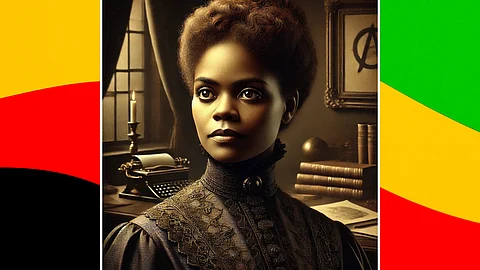
- Home
- About Us
- SOULIVITY TODAY Radio Show!
- COMMUNITY HUB
- GO SHOP by Soulivity!
- ColumnsColumns
- CultureCulture
- Lifestyle
- Contact Us!

When discussing Black history, names like Harriet Tubman, Rosa Parks, and Sojourner Truth often come to mind. However, there are many unsung heroes who shaped history through their resilience and activism. One such figure is Lucy Parsons, a fearless labor organizer, writer, and orator who fought for economic and social justice in the late 19th and early 20th centuries. Despite facing racial and gender discrimination, Parsons championed workers’ rights, free speech, and anarchism, making her one of the most radical voices of her time.
Lucy Parsons’ origins remain somewhat mysterious. She was born around 1851 in Virginia or Texas, possibly as an enslaved person. Though she identified as Mexican and Native American, many historians believe she had African ancestry. In the tumultuous years following the Civil War, she married Albert Parsons, a Confederate soldier-turned-Reconstruction-era activist. Due to their interracial marriage, they were forced to flee Texas for Chicago, where they became deeply involved in the labor movement.
Settling in Chicago in the 1870s, Lucy and Albert Parsons became active in the growing labor movement. Lucy Parsons, with her fiery rhetoric and impassioned speeches, advocated for an eight-hour workday, fair wages, and better conditions for workers. She became a leading voice for the working class, challenging corporate greed and government oppression.
In 1886, Albert Parsons was among the labor leaders arrested and executed following the Haymarket Affair, a rally for workers' rights that turned violent. After his death, Lucy became even more dedicated to the cause, traveling across the country to speak at labor rallies and publish writings promoting anarchist and socialist ideals. She fearlessly spoke out against economic inequality and racial oppression, often attracting the attention of law enforcement.
At a time when African American women faced immense societal limitations, Lucy Parsons shattered expectations. Unlike many Black activists of her era who focused on racial issues, Parsons framed her fight through the lens of class struggle, believing that capitalism oppressed all workers, regardless of race. This made her a unique figure in both the labor and civil rights movements.
Parsons was also one of the first Black women to speak publicly about political and economic injustice. She edited radical publications, wrote extensively, and addressed massive crowds, inspiring countless workers and activists. Her ability to captivate audiences earned her the nickname “The Most Dangerous Woman in America” from the Chicago police.
Despite government surveillance and repeated arrests, Lucy Parsons remained active well into the 20th century. She was involved in the Industrial Workers of the World (IWW), a revolutionary labor union, and continued advocating for free speech and workers’ rights until her death in 1942.
Though often overshadowed in mainstream historical narratives, Parsons’ contributions to labor rights, free speech, and racial justice remain profound. Her tireless efforts laid the groundwork for future civil rights activists and labor organizers, proving that change is possible through relentless resistance.
Lucy Parsons was a radical force who fearlessly fought for justice, economic equality, and freedom of speech. While she may not be as well-known as other historical figures, her impact is undeniable. This Black History Month, let’s celebrate her unwavering dedication to a fairer and more just society.
